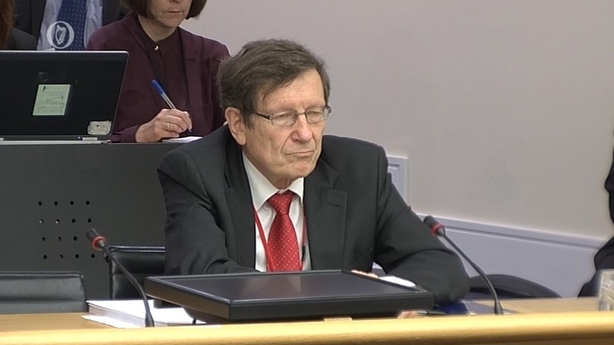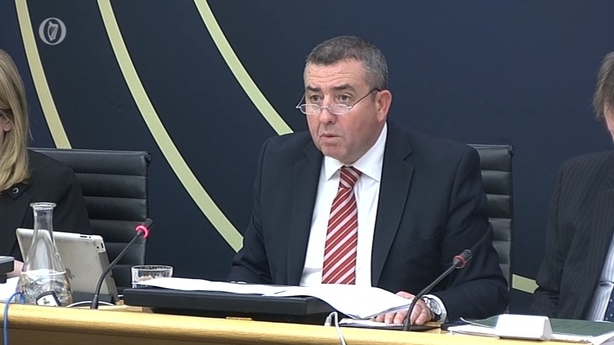Peter Nyberg has told the Banking Inquiry that staff were sanctioned if they questioned the prevailing view in banks during the Celtic Tiger.
Mr Nyberg, who was commissioned by the Government to write a report on the industry following its collapse, was speaking at the inquiry's first day of hearings.
He said he formed this view from interviews he conducted with people who worked in banks, and said that sanctions came in the form of professional advancement and remuneration.
Mr Nyberg also said there were also significant problems with auditors criticising banks.
He said if an auditor found a problem it had to raise it with a bank and if the problem was not addressed the auditor would have to resign.
No auditors did resign, he stated.
He said if the problems found by auditors were made public it would have resulted in big problems for banks.
Mr Nyberg added that there were warnings from Department of Finance staff, but they were not very strong and not very insistent.
They were very general warnings about overheating, he said.
Mr Nyberg said he interviewed 140 people for his report but did not speak with the European Central Bank. Any issue which could become subject to a Garda investigation was also not examined in his report, he added.
The Finnish banking expert said he had powers of compelability as part of his investigation, but did not have to use them. He said people were very co-operative.
He said his report was about the why and not the who. He was not required to name names and he decided not to. It was easier to get institutions when reputations were not under threat, he stated.
It was also easier to avoid legal challenges and the risk of redactions was lessened, he added.
The former IMF economist told Finance Committee members that he believed it was unlikely anything new would emerge from the Banking Inquiry.
However he added that it was important to ensure a similar crisis does not happen again.
The former IMF economist said his investigation understood the bank guarantee decision but did not condone it, adding that it was the culmination of mistakes made previously.

He said the guarantee decision came at the end of a long period after everyone judging risk had told each other and the Government that the banks were solvent and had no problems.
Efforts were made at the last minute, especially in the Department of Finance, to resolve the issues in an orderly manner, but that was not possible.
Sinn Féin's finance spokesman Pearse Doherty asked Mr Nyberg if there was scope for options other than the bank guarantee.
Mr Nyberg said the legal basis for more sophisticated solutions was not there and so nothing could be done on that basis.
During the night, there were discussions on alternatives - a shorter guarantee or reducing the scope - but for various reasons, those alternatives were not considered realistic, he told the committee.
In the end, the problems were bigger than foreseen and the efficiency of measures was reduced, he stated.
Mr Nyberg said the real estate mania in Ireland was unlikely to have resulted in a soft landing, even without the impact of the liquidity crisis in the US.
When asked what role the media played in blowing up the bubble, he said they reported positively on banks and the real estate market, which did have an effect.
Overall Mr Nyberg said the responsibility for the mistakes was obvious - it lay with directors, and senior and junior staff in the banks.
But he added that borrowers were also responsible for debt.
Mr Nyberg also said it was not fair to say we all partied, people just lived a little better than they otherwise would have done.
'Irish institutions pretty good at misjudging risk'
Fine Gael Senator Michael D'Arcy asked how Mr Nyberg thought the Irish banks were at judging risk.
The banking expert laughed and said he could not answer on the basis of his Commission's report, but he added that the Irish institutions were pretty good at misjudging risk.
Pearse Doherty asked if the crisis was essentially homegrown. Mr Nyberg said it was.
He said the Financial regulator should have been looking at the concentration of credit and how the risk mitigation procedures were not working.
Mr Nuberg said the Finance Department began to think of a resolution regime - how to wind up a bank - after Northern Rock in 2007.
But he said other institutions did not think it was a good idea because they thought the banks were solvent and that banks could be taken over by Government, he added.
If there had been a common will among politicians of an early resolutions regime it would have been possible to introduce, he said.
The committee will resume with Robert Wright, who wrote a report on the Department of Finance.
'Dark cloud of banking crisis lingers over every home'
Opening today's Inquiry, committee chairman Ciarán Lynch said that "the dark cloud of the banking and financial crisis still lingers over every home in Ireland".

Deputy Lynch said the Inquiry's task is to shed light on how the collapse happened and to ensure its dark shadow never falls on our country again.
He said the purpose of the Inquiry is to "identify and to learn from previous mistakes and to ensure that, as far as is possible, we do not create the circumstances which would lead to a similar disaster in the future".
The committee has the power to compel written and oral evidence, and Mr Lynch said there will be witness testimony, oral evidence, transcripts, detailed records - all presented in public.
The first phase of the inquiry will hear testimony from 30 witnesses and will set the context for the financial crash.
In April, the second phase of the process will hear from bankers, civil servants, politicians and regulators.
The inquiry is expected to conclude by November next year.
It will be the first time many of the key players will be questioned in public.
While the inquiry will be highly restricted in making adverse findings against individuals, hearing from those who have remained silent is likely to be its biggest contribution.
European Commission willing to attend Inquiry
Meanwhile, the European Commission has contacted the Banking Inquiry and told it that it is willing to provide witnesses to hearings, RTÉ News has learned.
The development comes after it emerged that the President of the European Central Bank, Mario Draghi, has ruled out participating in the hearings.
It is not yet clear who from the European Commission will appear at the hearings.
It is also understood that the International Monetary Fund has indicated that it will co-operate with the context phase of the Banking Inquiry which will examine the background to the collapse.

